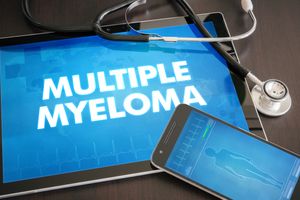- All Drug Categories
- Home
- Anti-cancer Drugs
- Healthcare Products
- Medical Information
- Statement
According to the American Cancer Society, approximately 12,000 deaths were caused by multiple myeloma (MM) in 2021. Current drug therapies on the market to treat MM include chemotherapy, corticosteroids, immunomodulating agents, proteasome inhibitors, histone deacetylase inhibitors, monoclonal antibodies, antibody-drug conjugates, and nuclear export inhibitors.

However, the MM pipeline is continuously expanding, with a variety of drugs on the horizon. Treatment options under way for MM include several medication classes, such as naked monoclonal antibodies, bispecific antibodies, and chimeric antigen receptor (CAR) T-cell therapy.
Pharmacogenomics also has a critical role in the MM drug pipeline. For this reason, pharmacists play an important part on the interdisciplinary team as educators of other health care professionals on treatment options in the works. It is crucial that patients’ health care teams remain up-to-date with the most current drug information for treatment optimization, and pharmacists can often be looked to as the primary sources of that information.
Mutiple Myeloma Drug Pipline
Naked Monoclonal Antibodies
Naked monoclonal antibodies are novel agents that target a specific protein on the surface of MM cells, enabling the patient’s immune system to eliminate the targeted myeloma cells.
Coming down the pipeline in this drug class is felzartamab (TJ202/MOR202; I-Mab), which is an investigational human monoclonal antibody directed against CD38 on the surface of MM cells that uses innovative technology derived from MorphoSys’ HuCAL.2 Patient enrollment for the phase 3 registrational trial in China of felzartamab in combination with lenalidomide (Revlimid; Bristol Myers Squibb) for second-line treatment of MM has completed, and the biologics license application is expected to be submitted to the US FDA in the near future.
The novel anti-CD38 antibody TAK-079 (Takeda) was shown to be safe and well tolerated in patients with relapsed/refractory MM, according to research presented at the 2020 American Society of Clinical Oncology Virtual Scientific Program.3,4 TAK-079 is a subcutaneously adminis- tered monoclonal antibody, and patients were eligible to participate in a phase 1b study of the drug after at least 3 lines of therapy and prior exposure to immunomodulatory drugs, proteasome inhibitors, alkylating agents, and corticosteroid therapy.4 In total, 34 patients were enrolled across 5 fixed-dose cohorts, and no serious systemic infusion-related reactions were reported in the preliminary results.
Bispecific Antibodies
Classified as antibody-based immunotherapy, bispecific antibodies contain 2 antibody fragments that have been fused together: One fragment targets myeloma cells (making them easier for the immune system to locate), and the other helps immune cells (by boosting their ability to find myeloma cells).3 Most agents in this class target B-cell maturation antigen (BCMA) on the myeloma cell and bind to a protein called CD3 found on the surface of T cells.
Elranatamab (PF-06863135; Pfizer Inc) is a BCMA CD3-targeted bispecific antibody being investigated in patients with relapsed/refractory MM. The phase 2 MagnetisMM-3 study (NCT04649359) is evaluating the safety of elranatamab given subcutaneously in patients with MM that is refractory to at least 1 drug therapy in each of the 3 major classes of medications approved for MM treatment, and the expected primary completion date is June.
Additionally, elranatamab has been granted fast track designation by the FDA. The phase 1 results from the study were presented at the 63rd American Society of Hematology Annual Meeting and Exposition in December 2020, with the results demonstrating that 83% of patients achieved a clinical response at the study dose, with no dose-limiting toxicities observed.5
CAR T-Cell Therapy
CAR T-cell therapy is a treatment in which the patient’s T cells are genetically changed to attack cancer cells.3 PHE885 (Novartis) is an investigational BCMA cell therapy infusion in phase 1 clinical trials for the treatment of relapsed/refractory MM.
The trial investigating PHE885 is currently recruiting patients, with an estimated enrollment of 40 participants. The primary outcome measure is dose-limiting toxicities during the first 28 days after administration and the incidence and severity of adverse events.
Pharmacogenomics and Precision Medicine
Utilizing pharmacogenomics enables treatments to be tailored through targeted therapies for MM based on patients’ genetic profile; this helps ensure an optimal response to a drug regimen. Over the years, even though survival has improved for patients with MM, most individuals eventually stop responding to treatment.
Currently, the ongoing phase 1/2 MyDRUG study (NCT03732703), which has an estimated primary completion date of February, is evaluating the following FDA-approved oncology medications targeting specific gene mutations, which could add future indications for MM:
• Cobimetinib (Cotellic; Genentech USA, Inc): RAF/RAS mutations
• Enasidenib (Idhifa; Celgene Corporation): IDH2 mutations
• Abemaciclib (Verzenio; Eli Lilly and Company): CDK mutations
• Erdafitinib (Balversa; Janssen Biotech, Inc): FGFR3 mutations
• Venetoclax (Venclexta; AbbVie Inc/Genentech USA, Inc): chromosomal translocation t(11;14)
References
https://www.pharmacytimes.com/view/a-look-at-multiple-myeloma-treatment-options-in-the-pipeline
Disclaimer:《A Look at Multiple Myeloma Treatment Options in the Pipeline》Edited and sorted by Seagull Pharmacy's editors. Please contact us in time if there is any infringement. In addition, the suggestions for drug usage, dosage and disease mentioned in the article are only for medical staff's reference, and can not be used as any basis for medication!